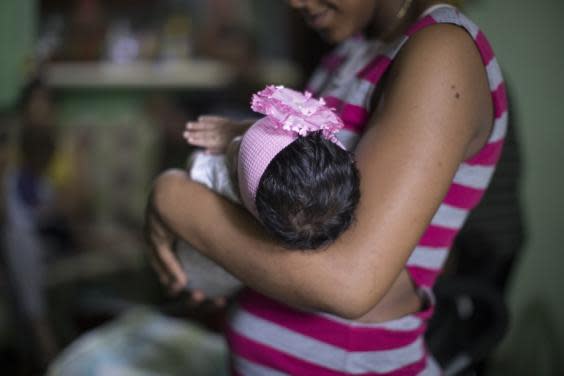Total abortion ban fueling teenage pregnancy and unsafe terminations in Dominican Republic, report finds
The total abortion ban, wholly inadequate sex education in schools and obstacles to accessing contraception are fuelling teenage pregnancy and unsafe abortion in the Dominican Republic, a new report has found.
The Dominican Republic has a deeply machismo culture and is one of the few countries in the world which has a complete ban on abortion - the procedure is illegal in all cases, including when the life of the woman or girl is at risk.
A report by Human Rights Watch found adolescent girls in the Caribbean country are being denied their sexual and reproductive rights – discovering that girls faced with an unwanted pregnancy are being forced into choosing between continuing with their pregnancies or getting clandestine backstreet abortions despite it often posing a profound risk to their health and lives.
The Dominican Republic has the highest teen pregnancy rate in Latin America and the Caribbean, according to the Pan American Health Organisation.
The Human Rights Watch report documented how authorities have delayed the rollout of a long-awaited sexuality education program - leaving hundreds of thousands of teenage girls and boys without scientifically accurate information about their health.
Margaret Wurth, senior women’s rights researcher at Human Rights Watch, said: “A teenage girl’s life and plans should not be derailed by an unwanted pregnancy. Lawmakers in the Dominican Republic should ensure that adolescent girls can get reliable sexual and reproductive health information, including at school, and adequate health services, including safe and legal abortion.
“Girls need to be equipped with the information and health services to prevent unwanted pregnancy and to make informed choices about their bodies and relationships. By denying their sexual and reproductive rights, Dominican authorities are failing to give girls and young women every opportunity to continue their education and live healthy, successful, and fulfilling lives.”
The campaigner noted that when abortion is criminalised, girls are often at greater risk of having an unsafe abortion because they possess less information about safer methods, and may not become aware they are pregnant until later in their pregnancy, making a clandestine abortion more dangerous.

The 50-page report is based on interviews with 30 girls and women who became pregnant before turning 18, and dozens of other people including students, LGBT+ youth, healthcare and social service providers, and experts in the field.
Public health data shows 21 per cent of girls and young women aged between 15 and 19 in the Dominican Republic become pregnant in their teenage years. Most of these pregnancies are unplanned or unwanted.
Human Rights Watch warn laws which criminalise abortion generate pervasive fear and push abortion underground. Girls and young women told researchers about the tremendous distress of discovering of an unplanned pregnancy.
“I felt like the world was falling down on me,” one young woman said. “I was going crazy, thinking I can’t have a kid.” Another said: “I was terrified”.
The report found sexual activity is often highly stigmatised for adolescent girls – with a girl with an unwanted pregnancy potentially being less able to pursue help than an adult woman. Several girls and young women told researchers they tried to have an abortion clandestinely before the age of 18.
Early pregnancy carries serious health risks for young mothers and their babies – with some of the young mothers interviewed having experienced complications during pregnancy or childbirth. Some of which resulted in the babies dying.
The World Health Organisation estimates that each year between five per cent to 12 per cent of maternal deaths globally can be attributed to unsafe abortion – with the annual cost of treating major complications from unsafe abortion estimated at $553m (£435m).
Human Rights Watch also note pregnant students and young mothers often find it hard, or even impossible, to continue their education. Some of those interviewed said they had to deal with discriminatory attitudes from teachers or school administrators and left school during pregnancy or after giving birth – with some having never gone back.
Many adolescents in the Dominican Republic also struggle to obtain confidential, non-stigmatising health services, and some go without important sexual and reproductive health care, such as contraception.
A 2013 Health Ministry survey, the most recent data available, found 27 per cent of girls and young women ages 15 to 19, and 21 per cent of those ages 20 to 24 have an unmet need for contraception.
The Dominican Republic has faced international scrutiny for failing to provide scientifically accurate, rights-based sexuality education in schools. In 2015, the authorities announced plans to incorporate comprehensive sexuality education into the national curriculum but the National Board of Education has not approved the new approach so that it can be carried out on a national scale.
The report comes in the wake of increasing numbers of states across America introducing bills that attempt to ban women from having abortions – with legislation to restrict abortion rights having been introduced in 16 states this year.
Anti-abortion activists hope legislation banning abortion being introduced across America will ultimately lead to the US Supreme Court reversing Roe vs Wade – the landmark Supreme Court decision that legalised abortion nationwide in 1973 – especially with new conservative justices Neil Gorsuch and Brett Kavanaugh sitting on the court.

 Yahoo News
Yahoo News 